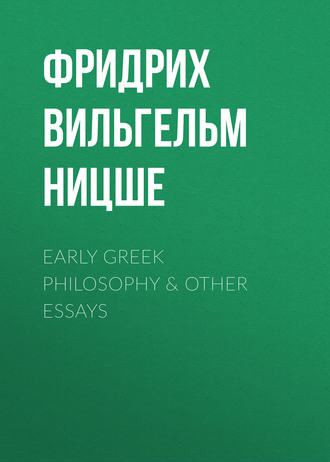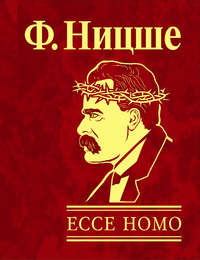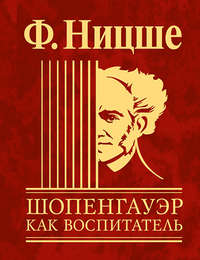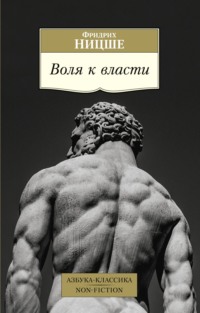 полная версия
полная версияEarly Greek Philosophy & Other Essays
In order to understand the latter we must start from the fact that the Greek genius admitted the existing fearful impulse, and deemed it justified; whereas in the Orphic phase of thought was contained the belief that life with such an impulse as its root would not be worth living. Strife and the pleasure of victory were acknowledged; and nothing separates the Greek world more from ours than the colouring, derived hence, of some ethical ideas, e. g., of Eris and of Envy.
When the traveller Pausanius during his wanderings through Greece visited the Helicon, a very old copy of the first didactic poem of the Greeks, "The Works and Days" of Hesiod, was shown to him, inscribed upon plates of lead and severely damaged by time and weather. However he recognised this much, that, unlike the usual copies, it had not at its head that little hymnus on Zeus, but began at once with the declaration: "Two Eris-goddesses are on earth." This is one of the most noteworthy Hellenic thoughts and worthy to be impressed on the new-comer immediately at the entrance-gate of Greek ethics. "One would like to praise the one Eris, just as much as to blame the other, if one uses one's reason. For these two goddesses have quite different dispositions. For the one, the cruel one, furthers the evil war and feud! No mortal likes her, but under the yoke of need one pays honour to the burdensome Eris, according to the decree of the immortals. She, as the elder, gave birth to black night. Zeus the high-ruling one, however, placed the other Eris upon the roots of the earth and among men as a much better one. She urges even the unskilled man to work, and if one who lacks property beholds another who is rich, then he hastens to sow in similar fashion and to plant and to put his house in order; the neighbour vies with the neighbour who strives after fortune. Good is this Eris to men. The potter also has a grudge against the potter, and the carpenter against the carpenter; the beggar envies the beggar, and the singer the singer."
The two last verses which treat of the odium figulinum appear to our scholars to be incomprehensible in this place. According to their judgment the predicates: "grudge" and "envy" fit only the nature of the evil Eris, and for this reason they do not hesitate to designate these verses as spurious or thrown by chance into this place. For that judgment however a system of Ethics other than the Hellenic must have inspired these scholars unawares; for in these verses to the good Eris Aristotle finds no offence. And not only Aristotle but the whole Greek antiquity thinks of spite and envy otherwise than we do and agrees with Hesiod, who first designates as an evil one that Eris who leads men against one another to a hostile war of extermination, and secondly praises another Eris as the good one, who as jealousy, spite, envy, incites men to activity but not to the action of war to the knife but to the action of contest. The Greek is envious and conceives of this quality not as a blemish, but as the effect of a beneficent deity. What a gulf of ethical judgment between us and him? Because he is envious he also feels, with every superfluity of honour, riches, splendour and fortune, the envious eye of a god resting on himself, and he fears this envy; in this case the latter reminds him of the transitoriness of every human lot; he dreads his very happiness and, sacrificing the best of it, he bows before the divine envy. This conception does not perhaps estrange him from his gods; their significance on the contrary is expressed by the thought that with them man in whose soul jealousy is enkindled against every other living being, is never allowed to venture into contest. In the fight of Thamyris with the Muses, of Marsyas with Apollo, in the heart-moving fate of Niobe appears the horrible opposition of the two powers, who must never fight with one another, man and god.
The greater and more sublime however a Greek is, the brighter in him appears the ambitious flame, devouring everybody who runs with him on the same track. Aristotle once made a list of such contests on a large scale; among them is the most striking instance how even a dead person can still incite a living one to consuming jealousy; thus for example Aristotle designates the relation between the Kolophonian Xenophanes and Homer. We do not understand this attack on the national hero of poetry in all its strength, if we do not imagine, as later on also with Plato, the root of this attack to be the ardent desire to step into the place of the overthrown poet and to inherit his fame. Every great Hellene hands on the torch of the contest; at every great virtue a new light is kindled. If the young Themistocles could not sleep at the thought of the laurels of Miltiades so his early awakened bent released itself only in the long emulation with Aristides in that uniquely noteworthy, purely instinctive genius of his political activity, which Thucydides describes. How characteristic are both question and answer, when a notable opponent of Pericles is asked, whether he or Pericles was the better wrestler in the city, and he gives the answer: "Even if I throw him down he denies that he has fallen, attains his purpose and convinces those who saw him fall."
If one wants to see that sentiment unashamed in its naïve expressions, the sentiment as to the necessity of contest lest the State's welfare be threatened, one should think of the original meaning of Ostracism, as for example the Ephesians pronounced it at the banishment of Hermodor. "Among us nobody shall be the best; if however someone is the best, then let him be so elsewhere and among others." Why should not someone be the best? Because with that the contest would fail, and the eternal life-basis of the Hellenic State would be endangered. Later on Ostracism receives quite another position with regard to the contest; it is applied, when the danger becomes obvious that one of the great contesting politicians and party-leaders feels himself urged on in the heat of the conflict towards harmful and destructive measures and dubious coups d'état. The original sense of this peculiar institution however is not that of a safety-valve but that of a stimulant. The all-excelling individual was to be removed in order that the contest of forces might re-awaken, a thought which is hostile to the "exclusiveness" of genius in the modern sense but which assumes that in the natural order of things there are always several geniuses which incite one another to action, as much also as they hold one another within the bounds of moderation. That is the kernel of the Hellenic contest-conception: it abominates autocracy, and fears its dangers; it desires as a preventive against the genius – a second genius.
Every natural gift must develop itself by contest. Thus the Hellenic national pedagogy demands, whereas modern educators fear nothing as much as, the unchaining of the so-called ambition. Here one fears selfishness as the "evil in itself" – with the exception of the Jesuits, who agree with the Ancients and who, possibly, for that reason, are the most efficient educators of our time. They seem to believe that Selfishness, i. e., the individual element is only the most powerful agens but that it obtains its character as "good" and "evil" essentially from the aims towards which it strives. To the Ancients however the aim of the agonistic education was the welfare of the whole, of the civic society. Every Athenian for instance was to cultivate his Ego in contest, so far that it should be of the highest service to Athens and should do the least harm. It was not unmeasured and immeasurable as modern ambition generally is; the youth thought of the welfare of his native town when he vied with others in running, throwing or singing; it was her glory that he wanted to increase with his own; it was to his town's gods that he dedicated the wreaths which the umpires as a mark of honour set upon his head. Every Greek from childhood felt within himself the burning wish to be in the contest of the towns an instrument for the welfare of his own town; in this his selfishness was kindled into flame, by this his selfishness was bridled and restricted. Therefore the individuals in antiquity were freer, because their aims were nearer and more tangible. Modern man, on the contrary, is everywhere hampered by infinity, like the fleet-footed Achilles in the allegory of the Eleate Zeno: infinity impedes him, he does not even overtake the tortoise.
But as the youths to be educated were brought up struggling against one another, so their educators were in turn in emulation amongst themselves. Distrustfully jealous, the great musical masters, Pindar and Simonides, stepped side by side; in rivalry the sophist, the higher teacher of antiquity meets his fellow-sophist; even the most universal kind of instruction, through the drama, was imparted to the people only under the form of an enormous wrestling of the great musical and dramatic artists. How wonderful! "And even the artist has a grudge against the artist!" And the modern man dislikes in an artist nothing so much as the personal battle-feeling, whereas the Greek recognises the artist only in such a personal struggle. There where the modern suspects weakness of the work of art, the Hellene seeks the source of his highest strength! That, which by way of example in Plato is of special artistic importance in his dialogues, is usually the result of an emulation with the art of the orators, of the sophists, of the dramatists of his time, invented deliberately in order that at the end he could say: "Behold, I can also do what my great rivals can; yea I can do it even better than they. No Protagoras has composed such beautiful myths as I, no dramatist such a spirited and fascinating whole as the Symposion, no orator penned such an oration as I put up in the Georgias – and now I reject all that together and condemn all imitative art! Only the contest made me a poet, a sophist, an orator!" What a problem unfolds itself there before us, if we ask about the relationship between the contest and the conception of the work of art! – If on the other hand we remove the contest from Greek life, then we look at once into the pre-Homeric abyss of horrible savagery, hatred, and pleasure in destruction. This phenomenon alas! shows itself frequently when a great personality was, owing to an enormously brilliant deed, suddenly withdrawn from the contest and became hors de concours according to his, and his fellow-citizens' judgment. Almost without exception the effect is awful; and if one usually draws from these consequences the conclusion that the Greek was unable to bear glory and fortune, one should say more exactly that he was unable to bear fame without further struggle, and fortune at the end of the contest. There is no more distinct instance than the fate of Miltiades. Placed upon a solitary height and lifted far above every fellow-combatant through his incomparable success at Marathon, he feels a low thirsting for revenge awakened within himself against a citizen of Para, with whom he had been at enmity long ago. To satisfy his desire he misuses reputation, the public exchequer and civic honour and disgraces himself. Conscious of his ill-success he falls into unworthy machinations. He forms a clandestine and godless connection with Timo a priestess of Demeter, and enters at night the sacred temple, from which every man was excluded. After he has leapt over the wall and comes ever nearer the shrine of the goddess, the dreadful horror of a panic-like terror suddenly seizes him; almost prostrate and unconscious he feels himself driven back and leaping the wall once more, he falls down paralysed and severely injured. The siege must be raised and a disgraceful death impresses its seal upon a brilliant heroic career, in order to darken it for all posterity. After the battle at Marathon the envy of the celestials has caught him. And this divine envy breaks into flames when it beholds man without rival, without opponent, on the solitary height of glory. He now has beside him only the gods – and therefore he has them against him. These however betray him into a deed of the Hybris, and under it he collapses.
Let us well observe that just as Miltiades perishes so the noblest Greek States perish when they, by merit and fortune, have arrived from the racecourse at the temple of Nike. Athens, which had destroyed the independence of her allies and avenged with severity the rebellions of her subjected foes, Sparta, which after the battle of Ægospotamoi used her preponderance over Hellas in a still harsher and more cruel fashion, both these, as in the case of Miltiades, brought about their ruin through deeds of the Hybris, as a proof that without envy, jealousy, and contesting ambition the Hellenic State like the Hellenic man degenerates. He becomes bad and cruel, thirsting for revenge, and godless; in short, he becomes "pre-Homeric" – and then it needs only a panic in order to bring about his fall and to crush him. Sparta and Athens surrender to Persia, as Themistocles and Alcibiades have done; they betray Hellenism after they have given up the noblest Hellenic fundamental thought, the contest, and Alexander, the coarsened copy and abbreviation of Greek history, now invents the cosmopolitan Hellene, and the so-called "Hellenism."
THE RELATION OF SCHOPENHAUER'S PHILOSOPHY TO A GERMAN CULTURE
Preface to an Unwritten Book (1872)In dear vile Germany culture now lies so decayed in the streets, jealousy of all that is great rules so shamelessly, and the general tumult of those who race for "Fortune" resounds so deafeningly, that one must have a strong faith, almost in the sense of credo quia absurdum est, in order to hope still for a growing Culture, and above all – in opposition to the press with her "public opinion" – to be able to work by public teaching. With violence must those, in whose hearts lies the immortal care for the people, free themselves from all the inrushing impressions of that which is just now actual and valid, and evoke the appearance of reckoning them indifferent things. They must appear so, because they want to think, and because a loathsome sight and a confused noise, perhaps even mixed with the trumpet-flourishes of war-glory, disturb their thinking, and above all, because they want to believe in the German character and because with this faith they would lose their strength. Do not find fault with these believers if they look from their distant aloofness and from the heights towards their Promised Land! They fear those experiences, to which the kindly disposed foreigner surrenders himself, when he lives among the Germans, and must be surprised how little German life corresponds to those great individuals, works and actions, which, in his kind disposition he has learned to revere as the true German character. Where the German cannot lift himself into the sublime he makes an impression less than the mediocre. Even the celebrated German scholarship, in which a number of the most useful domestic and homely virtues such as faithfulness, self-restriction, industry, moderation, cleanliness appear transposed into a purer atmosphere and, as it were, transfigured, is by no means the result of these virtues; looked at closely, the motive urging to unlimited knowledge appears in Germany much more like a defect, a gap, than an abundance of forces, it looks almost like the consequence of a needy formless atrophied life and even like a flight from the moral narrow-mindedness and malice to which the German without such diversions is subjected, and which also in spite of that scholarship, yea still within scholarship itself, often break forth. As the true virtuosi of philistinism the Germans are at home in narrowness of life, discerning and judging; if any one will carry them above themselves into the sublime, then they make themselves heavy as lead, and as such lead-weights they hang to their truly great men, in order to pull them down out of the ether to the level of their own necessitous indigence. Perhaps this Philistine homeliness may be only the degeneration of a genuine German virtue – a profound submersion into the detail, the minute, the nearest and into the mysteries of the individual – but this virtue grown mouldy is now worse than the most open vice, especially since one has now become conscious, with gladness of the heart, of this quality, even to literary self-glorification. Now the "Educated" among the proverbially so cultured Germans and the "Philistines" among the, as everybody knows, so uncultured Germans shake hands in public and agree with one another concerning the way in which henceforth one will have to write, compose poetry, paint, make music and even philosophise, yea – rule, so as neither to stand too much aloof from the culture of the one, nor to give offence to the "homeliness" of the other. This they call now "The German Culture of our times." Well, it is only necessary to inquire after the characteristic by which that "educated" person is to be recognised; now that we know that his foster-brother, the German Philistine, makes himself known as such to all the world, without bashfulness, as it were, after innocence is lost.
The educated person nowadays is educated above all "historically," by his historic consciousness he saves himself from the sublime in which the Philistine succeeds by his "homeliness." No longer that enthusiasm which history inspires – as Goethe was allowed to suppose – but just the blunting of all enthusiasm is now the goal of these admirers of the nil admirari, when they try to conceive everything historically; to them however we should exclaim: Ye are the fools of all centuries! History will make to you only those confessions, which you are worthy to receive. The world has been at all times full of trivialities and nonentities; to your historic hankering just these and only these unveil themselves. By your thousands you may pounce upon an epoch – you will afterwards hunger as before and be allowed to boast of your sort of starved soundness. Illam ipsam quam iactant sanitatem non firmitate sed iciunio consequuntur. (Dialogus de oratoribus, cap. 25.) History has not thought fit to tell you anything that is essential, but scorning and invisible she stood by your side, slipping into this one's hand some state proceedings, into that one's an ambassadorial report, into another's a date or an etymology or a pragmatic cobweb. Do you really believe yourself able to reckon up history like an addition sum, and do you consider your common intellect and your mathematical education good enough for that? How it must vex you to hear, that others narrate things, out of the best known periods, which you will never conceive, never!
If now to this "education," calling itself historic but destitute of enthusiasm, and to the hostile Philistine activity, foaming with rage against all that is great, is added that third brutal and excited company of those who race after "Fortune" – then that in summa results in such a confused shrieking and such a limb-dislocating turmoil that the thinker with stopped-up ears and blindfolded eyes flees into the most solitary wilderness, – where he may see, what those never will see, where he must hear sounds which rise to him out of all the depths of nature and come down to him from the stars. Here he confers with the great problems floating towards him, whose voices of course sound just as comfortless-awful, as unhistoric-eternal. The feeble person flees back from their cold breath, and the calculating one runs right through them without perceiving them. They deal worst, however, with the "educated man" who at times bestows great pains upon them. To him these phantoms transform themselves into conceptual cobwebs and hollow sound-figures. Grasping after them he imagines he has philosophy; in order to search for them he climbs about in the so-called history of philosophy – and when at last he has collected and piled up quite a cloud of such abstractions and stereotyped patterns, then it may happen to him that a real thinker crosses his path and – puffs them away. What a desperate annoyance indeed to meddle with philosophy as an "educated person"! From time to time it is true it appears to him as if the impossible connection of philosophy with that which nowadays gives itself airs as "German Culture" has become possible; some mongrel dallies and ogles between the two spheres and confuses fantasy on this side and on the other. Meanwhile however one piece of advice is to be given to the Germans, if they do not wish to let themselves be confused. They may put to themselves the question about everything that they now call Culture: is this the hoped-for German Culture, so serious and creative, so redeeming for the German mind, so purifying for the German virtues that their only philosopher in this century, Arthur Schopenhauer, should have to espouse its cause?
Here you have the philosopher – now search for the Culture proper to him! And if you are able to divine what kind of culture that would have to be, which would correspond to such a philosopher, then you have, in this divination, already passed sentence on all your culture and on yourselves!
PHILOSOPHY DURING THE TRAGIC AGE OF THE GREEKS
PREFACE
(Probably 1874)If we know the aims of men who are strangers to us, it is sufficient for us to approve of or condemn them as wholes. Those who stand nearer to us we judge according to the means by which they further their aims; we often disapprove of their aims, but love them for the sake of their means and the style of their volition. Now philosophical systems are absolutely true only to their founders, to all later philosophers they are usually one big mistake, and to feebler minds a sum of mistakes and truths; at any rate if regarded as highest aim they are an error, and in so far reprehensible. Therefore many disapprove of every philosopher, because his aim is not theirs; they are those whom I called "strangers to us." Whoever on the contrary finds any pleasure at all in great men finds pleasure also in such systems, be they ever so erroneous, for they all have in them one point which is irrefutable, a personal touch, and colour; one can use them in order to form a picture of the philosopher, just as from a plant growing in a certain place one can form conclusions as to the soil. That mode of life, of viewing human affairs at any rate, has existed once and is therefore possible; the "system" is the growth in this soil or at least a part of this system…
I narrate the history of those philosophers simplified: I shall bring into relief only that point in every system which is a little bit of personality, and belongs to that which is irrefutable, and indiscussable, which history has to preserve: it is a first attempt to regain and recreate those natures by comparison, and to let the polyphony of Greek nature at least resound once again: the task is, to bring to light that which we must always love and revere and of which no later knowledge can rob us: the great man.
LATER PREFACE
This attempt to relate the history of the earlier Greek philosophers distinguishes itself from similar attempts by its brevity. This has been accomplished by mentioning but a small number of the doctrines of every philosopher, i. e., by incompleteness. Those doctrines, however, have been selected in which the personal element of the philosopher re-echoes most strongly; whereas a complete enumeration of all possible propositions handed down to us – as is the custom in text-books – merely brings about one thing, the absolute silencing of the personal element. It is through this that those records become so tedious; for in systems which have been refuted it is only this personal element that can still interest us, for this alone is eternally irrefutable. It is possible to shape the picture of a man out of three anecdotes. I endeavour to bring into relief three anecdotes out of every system and abandon the remainder.
1
There are opponents of philosophy, and one does well to listen to them; especially if they dissuade the distempered heads of Germans from metaphysics and on the other hand preach to them purification through the Physis, as Goethe did, or healing through Music, as Wagner. The physicians of the people condemn philosophy; he, therefore, who wants to justify it, must show to what purpose healthy nations use and have used philosophy. If he can show that, perhaps even the sick people will benefit by learning why philosophy is harmful just to them. There are indeed good instances of a health which can exist without any philosophy or with quite a moderate, almost a toying use of it; thus the Romans at their best period lived without philosophy. But where is to be found the instance of a nation becoming diseased whom philosophy had restored to health? Whenever philosophy showed itself helping, saving, prophylactic, it was with healthy people; it made sick people still more ill. If ever a nation was disintegrated and but loosely connected with the individuals, never has philosophy bound these individuals closer to the whole. If ever an individual was willing to stand aside and plant around himself the hedge of self-sufficiency, philosophy was always ready to isolate him still more and to destroy him through isolation. She is dangerous where she is not in her full right, and it is only the health of a nation but not that of every nation which gives her this right.









